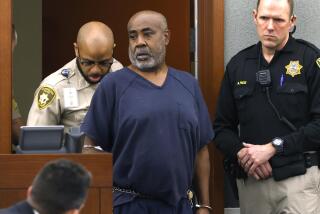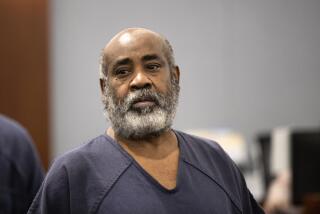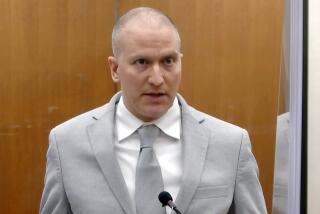Shakur was his hero, not his victim, says man some suspect
He says he bought every record Tupac Shakur ever made and followed every twist of the rap star’s controversial career--right up to its bloody conclusion Sept. 7, 1996, when Shakur was gunned down in Las Vegas by an unknown assailant.
A year after Shakur’s slaying, Lakewood resident Orlando Anderson says he still considers himself to be one of the rapper’s biggest fans.
Which is a sharp contrast to how other people consider Anderson.
Shakur’s mother filed a wrongful-death suit against him Friday, alleging that he fired the weapon that killed Shakur as he sat in a car. Los Angeles law enforcement sources say they still consider Anderson to be a suspect in Shakur’s slaying--although Las Vegas police say there is no direct evidence linking him to the unsolved homicide.
Police see Anderson, 23, as a hardened member of the Southside Crips gang. Anderson sees himself as an aspiring screenwriter robbed of his innocence. “I didn’t have anything to do with Tupac’s murder,” said Anderson, breaking his silence for the first time since being publicly linked to Shakur’s slaying last year. “To me, Tupac was like a hero. I admired him. I respected his music. Everybody I know had love for him.
“I wish they would hurry up and catch the killer so my name could be cleared. I don’t think the Las Vegas police have done a very good job trying to solve this case. It doesn’t just hurt Tupac’s mom, it hurts me too. Because until they catch the real killer, my innocence will never be proven.”
Los Angeles-area law enforcement sources were outraged by those words, feeling that the man they still suspect in the slaying was brazenly mocking them.
“It’s quite unusual for a person that some people believe might have been responsible for the murder to publicly criticize the police doing the investigation,” said Las Vegas Police Sgt. Kevin Manning, who seven months ago named Anderson as a possible suspect in the slaying. Manning acknowledged that the case is stalled with no new leads.
Anderson, who describes himself as an aspiring screenplay writer, also surprised Afeni Shakur, the rapper’s mother. On Sept. 8, he sued Shakur’s estate, seeking upward of $1 million for physical injuries and mental suffering stemming from an alleged assault by Shakur and several Death Row Records employees that occurred in the lobby of the MGM Grand Hotel just hours before the rapper was killed.
Shakur’s mother filed the wrongful-death suit in response four days later, basing her claims against Anderson on allegations detailed in a Compton police affidavit prepared last September to obtain search warrants for a pending gang raid.
The affidavit contends that Shakur’s killing was the result of gang rivalry between Death Row employees affiliated with the Mob Piru Bloods and the Southside Crips. A few hours after Anderson was beaten up in the hotel lobby, the affidavit says, he shot Shakur while the rapper and Death Row owner Marion “Suge” Knight were stopped at a red light.
According to the affidavit, several days after the slaying, Anderson was seen with a Glock .40-caliber handgun--the same kind of weapon used in the homicide. The affidavit also says that his cousin Jerry Bonds was seen later that week driving a white Cadillac--the same kind of vehicle used in the killing--into an auto body and sound shop in Compton.
“That entire affidavit is fiction,” Anderson said. “I’ve never been in a white Cadillac. I don’t have a cousin named Jerry Bonds. I don’t own a gun and I’ve never killed anybody. My moms didn’t raise me like that.
“These lies that this Compton police officer wrote about me have put my life in danger and brought stress on my family. Don’t they know how many fans Tupac had? I’m afraid to leave the house. I can’t sleep at night. That affidavit has just about ruined my life.”
Compton Police Capt. Percy Perrodin declined to comment on Anderson’s criticisms except to say, “We stand by our original affidavit, which was signed by a judge.” (Judges approve such affidavits because they believe that police have made a reasonable case that a search is warranted, not necessarily because they are convinced of a suspect’s guilt.)
*
Although Knight is named as a defendant in Anderson’s battery lawsuit, Anderson testified in November that the rap mogul did not participate in the beating, but actually tried to stop the fight. He now says he perjured himself in November, during a probation violation hearing for Knight, because he feared for his life.
The judge disregarded Anderson’s testimony and sent Knight to prison for a probation violation stemming from his role in the assault, which was captured on a hotel surveillance tape.
Police say that in addition to his gang affiliation, Anderson has been arrested several times in recent years but never convicted.
“I don’t hang with gangs,” said Anderson, dressed in a blue Hawaiian shirt and black slacks. “I don’t even have a record. I come from a tight family.”
Anderson, who was born in Compton and now lives with his mother in Lakewood, says he has an interest in breaking into the movie business by writing screenplays. Now unemployed, he says he spent most of the past year hammering out two film scripts with his older brother, a Berkeley film school graduate.
He said he graduated from Dominguez High School and studied at Compton Community College before dropping out to take a job at a hydraulic shop in Compton. He said he lost that job in August 1996 and has had difficulty finding employment since.
He said he went to Las Vegas with his girlfriend to gamble during the weekend that Shakur was shot, and wound up at the MGM after buying a ticket to the Mike Tyson-Bruce Seldon heavyweight fight, which was held at the hotel.
Anderson said he drove to Las Vegas in a black Blazer--not a white Cadillac--with his girlfriend and stayed at the Excalibur Hotel.
He said he encountered Shakur and his Death Row associates in the lobby as they were leaving the heavyweight fight. Anderson contends that he had never met any of Shakur’s entourage before that night and has no idea why they attacked him. The reason he did not press charges, Anderson says, was that he feared for his life.
Because his injuries were so severe, Anderson says it would have been impossible for him to pursue Shakur later and shoot him. Anderson says he went back to the Excalibur and stayed in bed until the next morning, when he and his girlfriend got up and returned to California in the black Blazer. Records indicate that he received treatment for a shoulder injury on Sept. 9, 1996, at UCLA Harbor Medical Center.
About a month later, Anderson was taken into custody during a gang raid on an outstanding warrant stemming from a slaying in Compton unrelated to Shakur’s death. According to Anderson, Shakur’s “All Eyez on Me” CD was playing on the stereo when police entered his place to arrest him Oct. 2, 1996.
“Before he put the cuffs on me, the officer picked up the CD jacket with Tupac’s photo on it and he asked me if I knew who it was,” Anderson recalled. “I said, ‘Man, everybody knows who that is.’ ”
Anderson said police told him that he was a suspect in Shakur’s slaying before they put him in the squad car. He was detained for two days but released Oct. 4 after Los Angeles prosecutors declined to charge him in the Compton slaying.
“When the Las Vegas police got done interviewing me in October, they told me I was no longer considered a suspect in the murder of Tupac,” Anderson said. “No one has ever contacted me or asked me a single question about it since. If they have all this evidence against me, then why haven’t they arrested me? It’s obvious that I’m innocent.”
More to Read
Start your day right
Sign up for Essential California for news, features and recommendations from the L.A. Times and beyond in your inbox six days a week.
You may occasionally receive promotional content from the Los Angeles Times.






